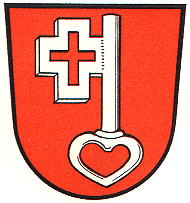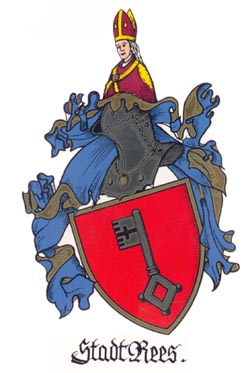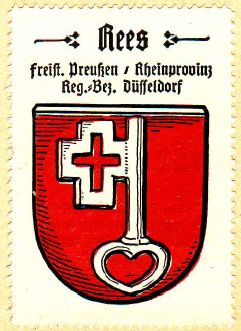Rees: Difference between revisions
Knorrepoes (talk | contribs) m (Text replacement - "{{de}}" to "") |
Knorrepoes (talk | contribs) m (Text replacement - "{| class="wikitable"↵|+Official blazon↵|-↵|'''German'''↵| ↵|-↵|'''English''' ↵| {{blazon wanted}}↵|}" to "{| class="wikitable" |+Official blazon |- |'''German''' | blazon wanted |- |'''English''' | blazon wanted |}") |
||
| Line 13: | Line 13: | ||
|- | |- | ||
|'''German''' | |'''German''' | ||
| | | blazon wanted | ||
|- | |- | ||
|'''English''' | |'''English''' | ||
| | | blazon wanted | ||
|} | |} | ||
Revision as of 08:34, 6 April 2023
REES
State : Nordrhein-Westfalen
District (Kreis) : Kleve (until 1974 Rees)
Additions : 1969 Amt Rees-Land, Amt Vrasselt (partly), Bergswick, Bienen, Esserden, Grietherbusch, Grietherort, Reesereyland, Reeserward, Speldrop, 1975 Amt Haldern, Amt Millingen, Empel, Groin, Haffen-Mehr (partly), Haldern, Heeren-Herken, Millingen
| German | blazon wanted |
| English | blazon wanted |
Origin/meaning
The arms were officially granted on ??-??-1965.
Rees became a city in 1228, the city rights were granted by Heinrich von Müllenark, Archbishop of Köln. The first seals showed St. Peter, the patron saint of Köln. In the 14th century the present arms appear.
The key is the symbol of St. Peter. In the 17th century often a knight or bishop is used as a supporter. Similarly, a buste of a bishop is often used as a crest in the 17-19th centuries.
The present arms were granted in 1965.
| The large arms with Bishop Heinrich von Müllenark as crest (Source) |
The arms by Hupp in the Kaffee Hag albums +/- 1925 |
Literature: Stadler, 1964-1971, 8 volumes.


